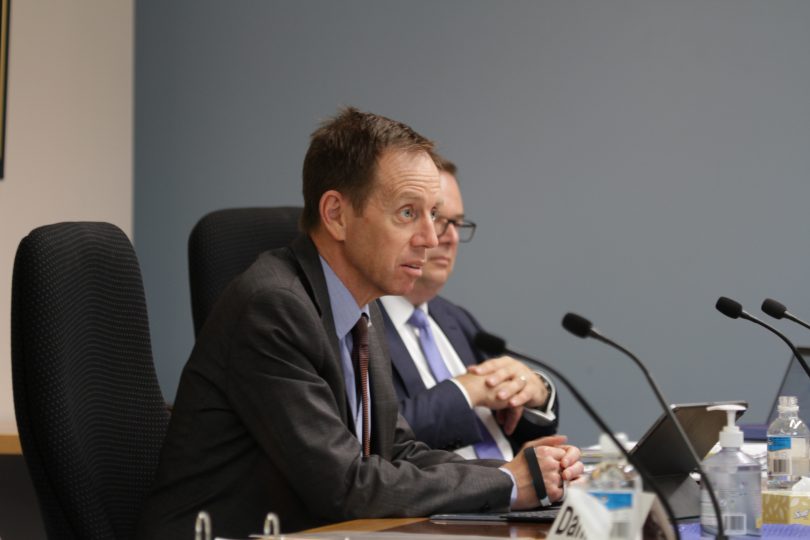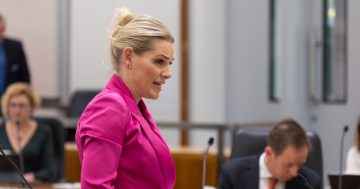
Opposition leader Elizabeth Lee has released a draft bill that would increase penalties for offences committed in the context of domestic or family violence. Photo: Michelle Kroll.
The Office of the Director of Public Prosecutions (DPP) has warned that sentences for domestic violence offences are too lenient in the ACT, putting the Territory out of step with most other Australian jurisdictions.
Aggravated offences that increase the penalty for offending in a family violence context were necessary to tackle the “evil” crime, deputy director of public prosecutions Anthony Williamson wrote in a letter to the chairperson of the Victims Advisory Board, Richard Glenn.
The letter, was obtained under freedom of information laws, was in response to the ACT Court of Appeal decision in R v UG (2020), in which the offender received a 16-month suspended sentence and served only four months in prison after attacking his wife with an axe and putting the axe to his daughter’s throat.
In the ACT, courts do not need to consider the dynamics of family violence or the implications of sustained domestic abuse when sentencing perpetrators.
This puts the Territory at odds with jurisdictions like NSW where there are mandatory sentences for family violence offences, and Queensland and Western Australia, which considers domestic violence as an aggravating factor when sentencing an offender.
The letter prompted the Canberra Liberals to release an exposure draft for family violence law reform for public consultation today (10 May), which would increase penalties, including jail time, for incidents involving domestic violence.
The draft legislation would impose additional sentencing penalties for 11 offences under the ACT Crimes Act when the offence occurs within the context of family violence. Aggravated offences were added to offences committed against pregnant women in 2005.

Attorney-General Shane Rattenbury is working on a family violence law reform package. Photo: Dominic Giannini.
Opposition leader Elizabeth Lee said the existing laws did not adequately recognise the evil of family violence.
“There is a concerning disconnect between what results from our court system and what the community expects when it comes to the seriousness in how family violence offences should be treated in the eyes of the law,” Ms Lee said in the proposed Bill’s explanatory statement.
“The Bill recognises the peripheral and long-term effects of family violence on victims and offers greater protection.
“[It] recognises that some acts of violence are worse than others and that family violence deserves separate and more severe treatment [and] reflects a community desire for appropriate sanctions for malicious acts of family violence that have become too common in our society.”
The final copy of the Bill will not be introduced to the Legislative Assembly until stakeholder and community feedback is considered.
The aforementioned case was directly brought to the attention of the Minister for Justice Health, Emma Davidson, in her incoming ministerial briefing at the end of last year.
It stated that the finding of there being no basis for a special approach to sentencing for family violence offences was “inconsistent with the sentencing principles of other Australian jurisdictions”.
“This finding … may discourage ACT courts from taking family violence into account,” the briefing said. “ACT sentencing law may require amendments to clarify principles for dealing with family violence offences.”
Attorney-General Shane Rattenbury said he was bringing legislation on family violence sentencing to today’s (10 May) Cabinet meeting and was hoping to introduce the Bill in June.
Ms Lee’s Bill will be considered in conjunction with the government’s Bill. Amendments to the current law will be in place be enacted by the end of the year absent any unexpected circumstances or Committee processes, Mr Rattenbury said.
The government’s legislation follows a review of the Family Violence Act 2016 that was handed to it last year.
The review identified inconsistent police responses to family violence orders, the exclusion of specific types of abuse and problems with after-hours orders as risk factors resulting in domestic violence victims falling through the cracks in the ACT.
Most of the people interviewed recommended amending the definition of family violence to cover technological abuse, coercive control and cultural abuse.





















